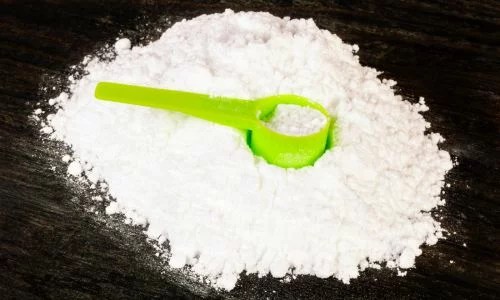Welcome to Super Achiever Club, where we elevate the standards of health, wealth, and social dynamics, guiding free-thinkers to become super achievers and positively impact the world.
Contents
Table of Creatine Benefits & Associated Research Studies
| Benefit Category | Specific Benefit | Description and Notes | Research Studies |
|---|---|---|---|
| Muscular Benefits | Increased Muscle Mass | Creatine promotes muscle hypertrophy, particularly beneficial for bodybuilders and athletes. | https://www.ncbi.nlm.nih.gov/pmc/articles/PMC8949037/ |
| Enhanced Strength and Power | Improves overall muscular strength, power output, and explosive performance. | https://www.ncbi.nlm.nih.gov/pmc/articles/PMC3407788/ | |
| Accelerated Muscle Recovery | Aids in faster recovery post-exercise by reducing muscle cell damage and inflammation. | https://link.springer.com/article/10.1007/s40279-022-01640-z | |
| Improved Muscle Endurance | Increases endurance for prolonged high-intensity exercise. | https://www.ncbi.nlm.nih.gov/pmc/articles/PMC3407788/ | |
| Athletic Performance | Enhanced Athletic Efficiency | Improves short-term performance in sports that require quick bursts of energy. | https://www.ncbi.nlm.nih.gov/pmc/articles/PMC3407788/ |
| Improved High-Intensity Exercise Capacity | Enhances capacity for high-intensity interval training (HIIT) and sprinting. | https://jissn.biomedcentral.com/articles/10.1186/s12970-017-0173-z | |
| Reduced Fatigue and Tiredness | Helps in delaying fatigue, allowing for more intense and longer training sessions. | https://pubmed.ncbi.nlm.nih.gov/11985880/ | |
| Neurological Benefits | Cognitive Function Support | May offer cognitive benefits, especially under conditions of mental fatigue and sleep deprivation. | https://bmcmedicine.biomedcentral.com/articles/10.1186/s12916-023-03146-5 |
| Potential Neuroprotective Effects | Suggests potential in slowing the progression of neurological diseases, though research is ongoing. | https://www.ncbi.nlm.nih.gov/pmc/articles/PMC8912287/ | |
| Health Benefits | Bone Density Improvement | Could play a role in improving bone density, beneficial for aging populations. | https://www.sciencedirect.com/science/article/abs/pii/S8756328222001442 |
| Glucose Metabolism | May improve glucose metabolism, which is important for individuals with type 2 diabetes. | https://www.ncbi.nlm.nih.gov/pmc/articles/PMC7915263/ | |
| Heart Function Support | Some evidence suggests it could improve heart function, particularly in those with heart conditions. | https://www.researchgate.net/publication/350717867_Role_of_Creatine_in_the_Heart_Health_and_Disease# | |
| Liver Health | May have protective effects on the liver, especially under certain stress conditions. | https://www.ncbi.nlm.nih.gov/pmc/articles/PMC9958770/ | |
| General Wellness | Anti-aging Effects | Theoretical potential in reducing age-related muscle loss. | https://www.ncbi.nlm.nih.gov/pmc/articles/PMC4304302/ |
| Vegetarian and Vegan Health | Especially important for diets low in natural creatine sources, like vegetarian and vegan diets. | https://pubmed.ncbi.nlm.nih.gov/32349356/ | |
| Mental Health Benefits | Some studies suggest a role in improving mood and reducing symptoms of depression. | https://link.springer.com/article/10.1007/s40279-023-01870-9# | |
| Specific Populations | Benefits in Elderly | May help in combating muscle loss and weakness in older adults. | https://pubmed.ncbi.nlm.nih.gov/21394604/ |
| Support for Neurodevelopmental Disorders | Early research suggests potential benefits in conditions like autism and ADHD. | https://www.ncbi.nlm.nih.gov/pmc/articles/PMC7916590/ | |
| Other Potential Benefits | Antioxidant Properties | Creatine may have secondary antioxidant properties, offering cellular protection. | https://www.ncbi.nlm.nih.gov/pmc/articles/PMC8000194/ |
| Enhanced Rehabilitation | Could aid in rehabilitation from injuries, particularly those involving muscles. | https://pubmed.ncbi.nlm.nih.gov/19490606/ | |
| Hormonal Regulation | Some evidence suggests it may influence hormonal pathways beneficial for muscle growth and overall health. | https://www.ncbi.nlm.nih.gov/pmc/articles/PMC7998865/ https://www.sciencedirect.com/science/article/abs/pii/S0765159715000039 |
Table of Creatine Side Effects / Risks & Associated Research Studies
| Side Effect Category | Specific Side Effect | Description and Notes | Research Studies |
|---|---|---|---|
| Gastrointestinal Issues | Digestive Discomfort | Can include bloating, stomach pain, and diarrhea, particularly at high doses. | https://pubmed.ncbi.nlm.nih.gov/18373286/ |
| Nausea | Some users report feeling nauseous, especially when creatine is not taken with food. | https://pubmed.ncbi.nlm.nih.gov/25984094/ | |
| Water Retention | Increased Water Retention | Creatine causes muscles to draw more water from the body, leading to increased water weight. | https://www.ncbi.nlm.nih.gov/pmc/articles/PMC155510/ |
| Dehydration | Due to increased water retention in muscles, there’s a potential risk of dehydration if fluid intake is not increased. | https://www.ncbi.nlm.nih.gov/pmc/articles/PMC1421496/ | |
| Electrolyte Imbalance | Excessive water retention may disrupt electrolyte balance, potentially leading to cramps. | https://www.ncbi.nlm.nih.gov/pmc/articles/PMC7871530/ | |
| Kidney and Liver Health | Strain on Kidneys | High doses over extended periods may put strain on the kidneys, especially in those with pre-existing kidney issues. | https://pubmed.ncbi.nlm.nih.gov/31859895/ |
| Liver Function | While rare, there have been concerns about liver health with excessive creatine use, though definitive evidence is lacking. | https://www.ncbi.nlm.nih.gov/pmc/articles/PMC9922125/ | |
| Muscular and Skeletal Effects | Muscle Cramping | Some users experience muscle cramps, possibly due to dehydration or electrolyte imbalances. | https://pubmed.ncbi.nlm.nih.gov/18184753/ |
| Weight Gain | Short-term weight gain due to increased water retention in muscles. | https://pubmed.ncbi.nlm.nih.gov/14636103/ | |
| Cardiovascular Effects | Blood Pressure Fluctuations | Creatine may cause minor fluctuations in blood pressure. | https://pubmed.ncbi.nlm.nih.gov/10694109/ |
| Cholesterol Levels | Some studies suggest changes in cholesterol levels, though evidence is not conclusive. | https://www.ncbi.nlm.nih.gov/pmc/articles/PMC9193312/ | |
| Metabolic Concerns | Insulin Sensitivity | There may be an impact on insulin sensitivity, important for those with diabetes or metabolic syndromes. | https://www.sciencedirect.com/science/article/abs/pii/S2405457721011104 |
| Metabolic Rate Changes | Creatine may influence metabolic rate, although research in this area is still developing. | https://www.ncbi.nlm.nih.gov/pmc/articles/PMC7739317/ | |
| Allergic Reactions | Skin Rash | Rare allergic reactions to creatine can manifest as skin rashes or itching. | https://www.ncbi.nlm.nih.gov/pmc/articles/PMC3504946/ |
| Respiratory Issues | In very rare cases, creatine can cause respiratory issues as part of an allergic reaction. | https://www.ncbi.nlm.nih.gov/pmc/articles/PMC6693921/. | |
| Others | Interference with Medications | Creatine may interact with certain medications, affecting their efficacy. | https://www.ncbi.nlm.nih.gov/pmc/articles/PMC4624319/ |
| Behavioral Changes | Rare reports of mood swings or changes in behavior, especially in high doses. | https://www.ncbi.nlm.nih.gov/pmc/articles/PMC3340488/ |
A Brief Overview
- Definition: Creatine is a naturally occurring compound, pivotal in supplying energy to muscle cells. It’s a staple in fitness regimes, revered for its impact on muscle growth, strength, and recovery.
- Popularity: In both fitness and medical communities, creatine stands as a highly researched and widely accepted supplement. It’s lauded for its efficacy and safety, earning a top spot in the supplement world.
Purpose of This Article
- In-Depth Analysis: We delve into the scientific realm of creatine, dissecting research and studies to bring forth a clear, factual narrative.
- Expert Insights: Through comprehensive analysis, we aim to elevate your understanding of creatine, backed by scientific evidence and expert opinions.
Importance of Understanding Creatine
- For Athletes: Whether you’re an elite competitor or a fitness enthusiast, understanding creatine can be a game-changer in your performance journey.
- For General Population: Beyond athletic performance, creatine holds significance in cognitive health and general wellbeing, making it a compound of interest for everyone.
Key Facts About Creatine
| Aspect | Detail |
|---|---|
| Natural Sources | Found in meat, fish, and produced in the human body. |
| Supplementation | Enhances physical performance, particularly in high-intensity workouts. |
| Health Benefits | Potential cognitive benefits and support in various health conditions. |
| Safety Profile | Well-tolerated with a strong safety record in short-term and long-term use. |
Explore Further on Creatine:
- Comparing Tongkat Ali vs. Creatine.
- Discovering What Creatine Is.
- Choosing the Best Creatine Pills and Capsules.
- Understanding Creatine HCl vs. Monohydrate.
Stay tuned as we explore the multifaceted world of creatine, illuminating its role in elevating your path to becoming a super achiever! 🌟
What is Creatine?
Welcome back to Super Achiever Club, where we explore the depths of health and fitness knowledge to empower you in your journey to greatness.
Chemical Composition and Biological Role of Creatine
- Chemical Nature: Creatine is a nitrogenous organic acid, chemically known as methylguanido-acetic acid.
- Biological Role: At its core, creatine plays a crucial role in energy production, especially in muscle cells. It aids in the formation of adenosine triphosphate (ATP), the cell’s energy currency.
Natural Sources of Creatine
- Synthesis in the Body: Creatine is naturally synthesized in the liver, pancreas, and kidneys from amino acids like arginine, glycine, and methionine.
- Dietary Sources: It’s also found in foods like red meat, fish, and poultry. However, the quantities in food can be limited, making supplementation an attractive option for many.
Historical Perspective
- Discovery: Creatine was first identified in 1832 by French chemist Michel Eugène Chevreul.
- Initial Uses: Its early use was predominantly in the medical field before gaining popularity in sports and fitness for its performance-enhancing properties.
Creatine Supplementation
Types of Creatine Supplements
- Varieties Available: The market offers various forms of creatine supplements, including creatine monohydrate, creatine ethyl ester, and micronized creatine. Each has unique characteristics and absorption rates.
- Popular Forms: Creatine monohydrate is the most researched and widely used form. Best micronized creatine offers enhanced solubility.
Mechanism of Action
- Cellular Level Workings: Creatine supplements increase the body’s store of phosphocreatine, aiding in the rapid regeneration of ATP during high-intensity activities.
- Enhancing Performance: This increase in ATP availability translates to improved strength, endurance, and recovery during exercise.
Who Benefits Most from Creatine Supplementation?

- Athletes and Bodybuilders: Particularly beneficial for those engaged in high-intensity, explosive sports and activities.
- Aging Populations: Emerging research suggests potential cognitive and muscular benefits in older adults.
- Vegetarians: Often have lower baseline creatine levels due to dietary restrictions, hence may experience more pronounced benefits.
Supplementation Benefits
| Demographic | Benefit |
|---|---|
| Athletes | Enhanced muscle mass, strength, and recovery. |
| Elderly Individuals | Potential improvements in muscle function and cognition. |
| Vegetarians | Compensation for dietary lack of creatine. |
Creatine Supplementation: Powering Up Your Performance
At Super Achiever Club, we’re dedicated to exploring the nuances of health supplements, empowering our community with the knowledge to excel.
Variety and Selection
- Creatine Monohydrate: The most researched and widely used form. Known for its efficacy and affordability.
- Micronized Creatine: Offers enhanced solubility and absorption. Learn More about the Best Micronized Creatine
- Creatine Ethyl Ester: Touted for better absorption by some, though research is mixed.
- Creatine Hydrochloride (HCL): Requires a smaller dosage. Discover the Best Creatine HCL
- Buffered Creatine: Claims to reduce side effects like bloating.
- Liquid Creatine: Convenient but may be less stable than powdered forms.
How Creatine Supplements Work
- ATP Production: Creatine increases the body’s phosphocreatine stores, aiding in the rapid regeneration of ATP, essential for high-intensity activities.
- Muscle Saturation: Over time, creatine supplementation leads to increased muscle creatine and phosphocreatine, enhancing physical performance and recovery.
Who Benefits Most from Creatine Supplementation?
Ideal Demographics and Scenarios

- Athletes in High-Intensity Sports: Ideal for those requiring bursts of speed and power.
- Bodybuilders: Aids in muscle growth and recovery during intense training regimes.
- Elderly Individuals: Potential to improve muscle function and overall health.
- Vegetarians and Vegans: Often have lower baseline creatine levels, hence may see more pronounced benefits.
- Cognitive Enhancement: Emerging research suggests benefits in cognitive tasks and mental fatigue.
The Research Perspective
Analysis of Major Studies
- Strength and Power: Numerous studies, such as this one, show significant improvements in strength and power output.
- Endurance: Creatine is less effective for endurance sports but can still offer benefits in high-intensity interval training.
Role in Muscle Growth, Strength, and Endurance
Muscle Building and Recovery
- Muscle Hypertrophy: Creatine supplementation has been shown to enhance muscle mass gain when combined with resistance training.
- Recovery: Speeds up muscle recovery post-exercise, reducing muscle damage and inflammation.
Cognitive Benefits: Emerging Research
Creatine and Brain Function
- Cognitive Function: Studies indicate potential improvements in memory and intelligence tasks, especially under conditions of mental fatigue or sleep deprivation.
- Brain Health: Suggests a protective role in neurodegenerative diseases, though more research is needed.

Explore Further:
- Best Creatine Pills and Capsules
- Creatine for Weight Loss
- Creatine Side Effects
- Best Creatine for Muscle Growth
A Deep Dive into Scientific Discoveries
Overview of Landmark Research Studies
Pioneering Discoveries in Creatine Research
- Methodologies: Studies typically involve randomized controlled trials, meta-analyses, and longitudinal research.
- Findings: Research consistently shows creatine’s effectiveness in enhancing muscle strength, power, and endurance. Studies like this one provide compelling evidence.
Ongoing Research and Future Directions
The Evolving Landscape of Creatine Study
- Cognitive Function: Exploring creatine’s role in brain health and cognitive enhancement.
- Age-Related Muscle Loss: Investigating its efficacy in combating sarcopenia in the elderly.
- Disease Management: Potential roles in managing neurological and muscular disorders.
Role of Creatine in Medical Research
Potential Therapeutic Applications
- Neuroprotective Properties: Research suggests benefits in neurodegenerative conditions like Parkinson’s and Alzheimer’s.
- Muscle Disorders: Potential treatment for muscular dystrophies and other muscle-wasting diseases.
- Metabolic Functions: Studying creatine’s impact on metabolism and related disorders.
What is Creatine Used For?
At Super Achiever Club, we believe in understanding the full spectrum of a supplement’s capabilities.
Athletic Performance
Creatine in Sports and Exercise
- Strength Training: Widely used for gains in muscle strength and size. Learn More about Creatine for Muscle Growth
- High-Intensity Sports: Ideal for sports requiring bursts of speed and power, like sprinting and weightlifting.
- Endurance Training: Emerging evidence suggests benefits in high-intensity interval training.

Medical Use Cases
Creatine in Treatment of Medical Conditions
- Neurological Disorders: Potential benefits in cognitive function and neuroprotection.
- Muscle Diseases: Being explored as a supportive treatment in muscle dystrophies.
- Metabolic Syndromes: Research into its role in glucose metabolism and diabetes management.
Everyday Use
Benefits for the General Population
- For the Elderly: Can aid in maintaining muscle mass and strength, enhancing overall quality of life.
- Cognitive Health: Possible benefits in mental acuity and reducing mental fatigue.
- General Well-being: Aids in overall physical performance and recovery, beneficial even for non-athletes.
Unpacking the Research
Analysis of Safety Studies on Creatine Use
Short-Term and Long-Term Safety
- Short-Term Use: Extensive research, including studies like this one, indicates that short-term use of creatine is generally safe and well-tolerated.
- Long-Term Use: Longer-term studies suggest creatine remains safe over extended periods, although ongoing monitoring is recommended.
Possible Side Effects and Contraindications
Understanding the Risks
- Side Effects: Common side effects include muscle cramping, nausea, and digestive issues, although these are typically mild.
- Contraindications: Individuals with kidney disorders or those taking nephrotoxic medications should be cautious. Learn More about: Is creatine safe for teens?
Official Stance of Medical and Sports Organizations
Endorsements and Cautions
- General Consensus: Major health and sports organizations, including the International Society of Sports Nutrition, recognize creatine as a safe and effective supplement.
- Usage Guidelines: These organizations recommend proper dosing and advise caution for specific populations. Discover Creatine Benefits
Effects of Creatine
Understanding how creatine impacts the body is crucial for informed supplementation.
Short-Term and Long-Term Effects on the Body
Immediate and Prolonged Impact
- Short-Term Effects: Rapid improvement in high-intensity exercise capacity and muscle power.
- Long-Term Effects: Consistent use leads to increased muscle mass and strength over time.
Metabolic Impact of Creatine
How It Affects Energy Production
- Energy Boost: Enhances the body’s ability to produce ATP, providing more energy during high-intensity activities.
- Muscle Metabolism: Improves muscle cells’ efficiency in using energy, potentially impacting overall metabolism. Explore: How does creatine work?
Psychological Effects
Examining the Impact on Mood and Cognition
- Mood: Some anecdotal reports suggest mood enhancement, but more research is needed for conclusive evidence.
- Cognitive Function: Studies indicate potential cognitive benefits, especially under stress or fatigue. Read More about what does creatine do for men
Table: Creatine Safety and Effects
| Aspect | Detail |
|---|---|
| Short-Term Safety | Generally well-tolerated with minimal side effects. |
| Long-Term Safety | Safe with continued use, but regular monitoring suggested. |
| Metabolic Impact | Boosts ATP production, enhancing energy during exercise. |
| Psychological Impact | Potential cognitive benefits; mood effects require more research. |

Summarizing Key Findings from Major Studies and Clinical Trials
Pioneering Research Insights
- Enhanced Athletic Performance: Studies consistently show significant improvements in strength, power, and endurance.
- Muscle Mass Increase: Evident benefit in muscle hypertrophy, especially when combined with resistance training.
- Cognitive Function: Emerging research suggests possible cognitive benefits under stress or fatigue.
Statistical Analysis of Study Results
Understanding the Numbers
- Effect Sizes: Most studies report medium to large effect sizes for strength and muscle mass gains.
- Significance: High statistical significance, indicating that the results are not due to chance.
- Real-World Implications: These findings translate to noticeable improvements in athletic performance and potentially cognitive function.
Critiques and Limitations of Current Creatine Research
Areas for Future Exploration
- Population Diversity: Most studies focus on young, male athletes, with less research on women and older populations.
- Long-Term Effects: While short-term safety is well-established, long-term effects need more extensive research.
- Cognitive Benefits: Though promising, the impact on cognitive functions requires further investigation.

Personal Opinion & Experiences
As far as I know, there’s not a sports supplement better studied than creatine. And few have so many benefits to offer too. So if you have the money & believe this can improve your life – go for it! No need to wait for any more research…
– Felix Hesse (Founder of SAC)
What is Creatine: A Scientific Perspective
Diving deeper into the molecular world of creatine.
Detailed Scientific Explanation at a Molecular Level
Creatine’s Biochemical Nature
- Molecular Structure: Creatine is a compound formed from amino acids: arginine, glycine, and methionine.
- Energy Production: Plays a crucial role in the regeneration of ATP, the primary energy currency of cells.
Comparison with Other Similar Supplements and Compounds
Creatine Among its Peers
- Versus Other Supplements: Creatine is unique in its direct role in ATP production, unlike protein supplements or BCAAs.
- Synergistic Effects: Often used in conjunction with other supplements like whey protein for enhanced muscle growth.

Misconceptions and Myths Debunked
Separating Fact from Fiction
- Water Retention Myth: While creatine can increase water retention in muscles, it does not cause harmful bloating or water imbalance.
- Kidney Damage Concern: Research indicates that creatine is safe for individuals with healthy kidneys. Read More about creatine kidneys
- Performance-Enhancing Steroid Myth: Creatine is not a steroid; it’s a naturally occurring compound with different mechanisms. Learn More about Is creatine a steroid?
Choosing the Right One
Factors to Consider When Choosing a Creatine Supplement
Tailoring Your Choice to Your Needs
- Purity and Quality: Look for supplements with no added artificial ingredients or fillers.
- Form of Creatine: Consider which type of creatine suits your body and goals.
- Absorption Rate: Some forms are absorbed more efficiently than others.
- Budget and Value: Balance cost-effectiveness with quality.
Comparison of Different Forms of Creatine Supplements
Understanding the Varieties
- Creatine Monohydrate: The most researched form, known for its effectiveness and affordability. Learn More about the best creatine monohydrate
- Creatine Ethyl Ester: Claimed to have better absorption but lacks significant research backing.
- Micronized Creatine: Smaller particles for easier mixing and potentially better absorption. Explore the best micronized creatine
- Creatine HCL: Requires a smaller dose, with claims of reduced side effects. Discover the best creatine HCL
Recommendations Based on Individual Needs and Goals
Personalizing Your Creatine Choice
- For Muscle Gain: Creatine monohydrate is a proven choice for increasing muscle mass.
- For Sensitive Stomachs: Micronized creatine or creatine HCL can be more gentle on the digestive system.
- For Convenience: Pre-mixed liquid creatine or creatine gummies offer easy consumption. Check out the best creatine Gummies
FAQ Section

- Is Creatine Safe for Long-Term Use?
- Insights: Long-term studies suggest creatine is safe with consistent use, although ongoing monitoring is advisable.
- Can Creatine Cause Kidney Damage?
- Evidence-Based Response: Research indicates that creatine does not cause kidney damage in healthy individuals. Read More about creatine kidneys
- How Does Creatine Affect Muscle Growth?
- Biological Process: Creatine increases phosphocreatine stores in muscles, aiding in ATP production and enhancing growth and recovery.
- Is Creatine Beneficial for Cognitive Function?
- Research Overview: Some studies show potential cognitive benefits, especially under mental stress or fatigue.
- Can Vegetarians Benefit More from Creatine Supplementation?
- Dietary Considerations: Vegetarians might experience more significant benefits due to lower baseline creatine levels. Explore the best vegan creatine
- Are There Any Age Restrictions for Taking Creatine?
- Guidelines: Generally safe for various age groups, but adolescents and older adults should consult healthcare providers first.
- How Quickly Does Creatine Start Showing Effects?
- Timeline: Effects on performance can be noticed as early as a week with proper loading; muscle gains take longer.
- What is the Best Form of Creatine Supplement?
- Comparative Analysis: Monohydrate for efficacy and cost, HCL or micronized for digestion and absorption efficiency.
- Can Creatine Supplementation Aid in Weight Loss?
- Metabolic Role: Creatine can indirectly support weight loss by enhancing workout performance and muscle growth, leading to increased metabolic rate.
- Should Creatine Be Cycled, or Can It Be Taken Continuously? – Supplementation Strategies: Cycling creatine (periods of use followed by breaks) is not necessary for everyone. Continuous use is generally safe, but individual preferences and goals should guide this decision. Learn More about: How often should you take creatine?
Creatine Supplement Comparison
| Form of Creatine | Pros | Cons |
|---|---|---|
| Monohydrate | Well-researched, cost-effective | Can cause bloating in some cases |
| Ethyl Ester | Enhanced absorption claims | Less research backing |
| Micronized | Better solubility, gentle on stomach | Slightly more expensive |
| Creatine HCL | Lower doses needed, less bloating | Needs more comparative research |
Your Health, Your Choice – Make It Count! 🌟💪🔬
Remember, at Super Achiever Club, it’s not just about achieving fitness goals; it’s about making informed choices that contribute to your overall well-being and success. Join us as we continue to explore and demystify the world of health supplements, empowering you to become a super achiever in every aspect of your life!



